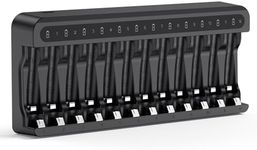Buying Guide for the Best Aa Aaa Battery Chargers
When choosing an AA/AAA battery charger, it's important to consider your specific needs and how you plan to use the charger. Whether you're a frequent user of rechargeable batteries or just need a reliable charger for occasional use, understanding the key features and specifications will help you make an informed decision. Consider the types of batteries you use most often, the charging speed you require, and any additional features that might enhance your charging experience.Charging SpeedCharging speed refers to how quickly a charger can recharge your batteries. This is important because it determines how long you'll have to wait before your batteries are ready to use again. Chargers are generally categorized into slow, medium, and fast chargers. Slow chargers may take several hours to fully charge batteries, which is suitable for overnight charging. Medium chargers typically take a few hours and are a good balance for regular use. Fast chargers can recharge batteries in under an hour, ideal for those who need quick turnaround times. Consider how often and how quickly you need your batteries charged to choose the right speed for you.
Battery CompatibilityBattery compatibility refers to the types of batteries a charger can handle. This is crucial because not all chargers can charge both AA and AAA batteries, or different chemistries like NiMH or NiCd. Some chargers are versatile and can handle multiple sizes and types, while others are more specialized. If you use a variety of battery types, a universal charger might be best. However, if you consistently use one type, a charger specifically designed for that type may offer better performance.
Number of Charging SlotsThe number of charging slots indicates how many batteries can be charged at once. This is important for efficiency, especially if you use a lot of batteries. Chargers typically come with 2, 4, or 8 slots. If you frequently use multiple devices that require batteries, a charger with more slots will be more convenient. For occasional use, a charger with fewer slots may suffice. Consider how many batteries you typically need to charge at one time to determine the right number of slots for you.
Smart Charging FeaturesSmart charging features include capabilities like automatic shut-off, trickle charging, and individual cell monitoring. These features are important for battery health and safety. Automatic shut-off prevents overcharging, which can damage batteries. Trickle charging keeps batteries at full charge without overcharging. Individual cell monitoring ensures each battery is charged optimally. If you want to maximize battery lifespan and ensure safe charging, look for chargers with these smart features.
PortabilityPortability refers to how easy it is to transport and use the charger on the go. This is important if you travel frequently or need to charge batteries in different locations. Portable chargers are typically lightweight and compact, sometimes with foldable plugs or USB charging options. If you need a charger for travel or outdoor use, consider a portable model. For home use, portability may be less of a concern, and you might prioritize other features instead.
















